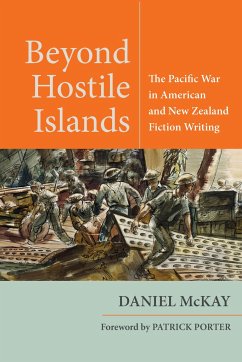"Beyond Hostile Islands is a beautifully-written, convincing, and accurate depiction of the Pacific War canon of Anglophone literature. It deploys American and New Zealand literary sources to trace the Allied racial hostility against Japan and its aftermath, as well as the dual imperialisms of Japan and the US."-Audrey Wu Clark, United States Naval Academy, author of Asian American Players, and Book Reviews Editor for the Society for US Intellectual History. "McKay's approach to diverse Anglophone war literature authors, ranging from James Jones and Robert Barclay to Keri Hulme and Ruth Ozeki, allows readers to see the Pacific both locally and globally, genre by genre, helping to provide a necessary intertext of critique and vision amid the creative resources of hope and survivance."-Rob Sean Wilson, University of California, Santa Cruz, author of Reimagining the American Pacific: From South Pacific to Bamboo Ridge and Beyond. "In this engagingly-written book, McKay has convincingly bridged the fields of literary studies and memory studies to offer a nuanced and thought-provoking account of the Pacific War in Anglophone literature. The New Zealand/Pacific Islands perspective adds a fresh comparative angle to the more familiar issues within US-Japan literary representations. The impressive range of (hi)stories discussed covers the well-known (Bridge on the River Kwai) to the all-but-forgotten (Japanese internment in New Zealand)."-Philip Seaton, Tokyo University of Foreign Studies, author of Japan's Contested War Memories: The 'Memory Rifts' in Historical Consciousness of World War II. Offers a fascinating window into how the fraught politics of apology in the East Asian region have been figured in anglophone literary fiction. The Pacific War, 1941-1945, was fought across the world's largest ocean and left a lasting imprint on Anglophone literary history. However, studies of that imprint or of individual authors have focused on American literature without drawing connections to parallel traditions elsewhere. Beyond Hostile Islands contributes to ongoing efforts by Australasian scholars to place their national cultures in conversation with those of the United States, particularly regarding studies of the ideologies that legitimize warfare. Consecutively, the book examines five of the most significant historical and thematic areas associated with the war: island combat, economic competition, internment, imprisonment, and the atomic bombing of Hiroshima and Nagasaki. Throughout, the central issue pivots around the question of how or whether at all New Zealand fiction writing differs from that of the United States. Can a sense of islandness, the 'tyranny of distance,' M¿ori cultural heritage, or the political legacies of the nuclear-free movement provide grounds for distinctive authorial insights? As an opening gambit, Beyond Hostile Islands puts forward the term 'ideological coproduction' to describe how a territorially and demographically more minor national culture may accede to the essentials of a given ideology while differing in aspects that reflect historical and provincial dimensions that are important to it. Appropriately, the literary texts under examination are set in various locales, including Japan, the Solomon Islands, New Zealand, New Mexico, Ontario, and the Marshall Islands. The book concludes in a deliberately open-ended pose, with the full expectation that literary writing on the Pacific War will grow in range and richness, aided by the growth of Pacific Studies as a research area. Daniel McKay is an associate professor in the English Department at New Mexico Military Institute. His articles have appeared in MELUS, Mosaic, positions: east asia cultures critique, and University of Toronto Quarterly , among others.
Hinweis: Dieser Artikel kann nur an eine deutsche Lieferadresse ausgeliefert werden.
Hinweis: Dieser Artikel kann nur an eine deutsche Lieferadresse ausgeliefert werden.

